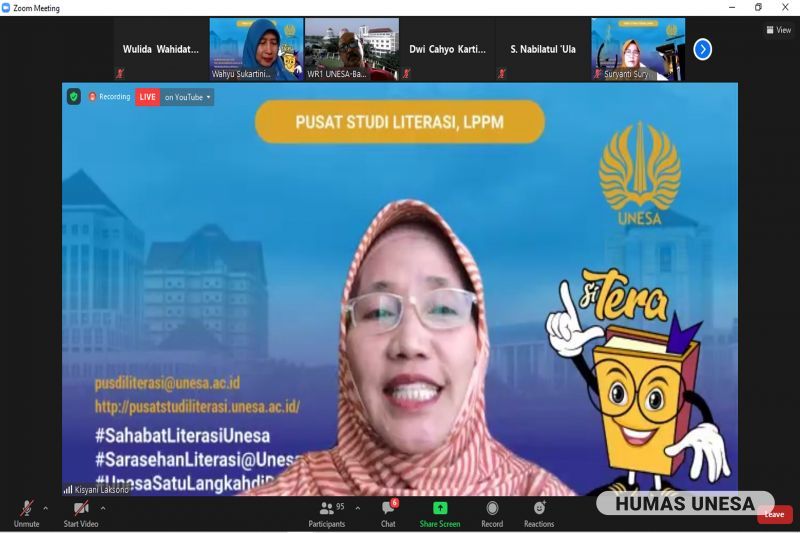
www.unesa.ac.id
Unesa.ac.id, Surabaya-The Center for Literacy Studies, Research and Development Institute for the Community (LPPM) UNESA held a National online workshop (Sadaring) on Saturday (26/6). The workshop was the second in a series with the theme “Assessment in Elementary School Learning”. The resource persons presented were the UINSA Professor, Prof. Dr. Kusaeri, M.Pd and Professor of FIP UNESA Prof. Suryanti, M.Pd. In addition there is also Dr. Anas Ahmadi, M.Pd as UNESA FBS Lecturer.
The event was hosted by Prof. Dr. Wahyu Sukartiningsih, M.Pd was attended by 467 participants from various regions in Indonesia. The Center for Literacy Studies has also developed SARGAM, namely Workshops Via Telegram so that all participants can be accommodated and participate in workshop activities properly.
Vice Chancellor for Academic Affairs Prof. Dr. Bambang Yulianto, M.Pd. in his remarks as well as opening the event said that the activity was one of UNESA's efforts through the Center for Literacy Studies, LPPM in answering problems and questions from the community and educators regarding the implementation of learning assessments in elementary schools.
According to him, the discussion in the event was very interesting, because it was in accordance with the Ministry of Education and Culture's policy which emphasized the importance of minimum competency assessment (AKM) starting from elementary school. In addition, many of the educators need information and knowledge about assessment. "With this, hopefully it will be an enlightenment for teachers in implementing SKM in their respective schools," he hoped.
Meanwhile, Prof. Dr. Kusaeri, M.Pd. in his presentation said that AKM is a basic competency that students need to be able to learn. Whatever the material and subject. He continued, the AKM material is divided into two, namely literacy or reading and writing and numeracy literacy.
The intended literacy is not just the ability to read, but also the ability to analyze a reading and the ability to understand or understand the concepts behind the writing. While numeration is the ability to analyze and use numbers.
Literacy and numeracy are not just about language or mathematics, but the ability of students to use this literacy concept to analyze a material. "The AKM and the character survey consist of questions that measure the ability to reason using language, the ability to reason using numeracy, and strengthening character education," he said.
Furthermore, Prof. Suryanti, M.Pd said that reading skills do not happen by themselves. However, the teacher must demonstrate and teach how to think strategies in reading activities. "This is a paradigm in the learning process so that assessment affects learning," he said.
In addition, referring to the results of PISA 2012 that the majority of 15 year old students do not yet have basic literacy in reading, mathematics and science. Indonesian children will not be competitive if at school they are not trained in 21st century life skills. "Such as the ability to think critically, make conclusions, solve problems and apply their knowledge in real-life contexts and in unfamiliar situations," he explained.
Meanwhile, Dr. Anas Ahmadi, M.Pd explained about "Assessment of Reading Literacy and Numeration". Anas said that often the assessment in learning is still partial and has not touched all aspects. "So the results of the reading and numeracy literacy assessments are also still low and have not given satisfactory results," he said.
Prof. Dr. Wahyu Sukartiningsih, M.Pd said that this online workshop is a manifestation of LPPM Unesa's concern through the Literacy Study Center to continue to provide the best for teachers and the community. He hopes that this literacy workshop can be useful for teachers, students and all participants in implementing minimum competency assessments in the midst of the Covid-19 pandemic. (Unesa Public Relations)
Share It On:






